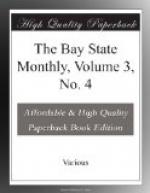As he said this he tore into shreds the old commission and threw them into the ancient cellar.
* * * * *
ELIZABETH.[5]
A ROMANCE OF COLONIAL DAYS.
By Frances C. Sparhawk, Author of “A Lazy Man’s Work.”
CHAPTER XXII.
THE ARMY SAILS.
Winter was over by the calendar. But neither the skies nor the thermometer agreed with that. Spring could not bring forward evidences of her reign while her predecessor’s snowy foot was still planted upon the earth, and showed no haste to get under it. The season had been unusually mild, but it lingered, fighting the battle with its last reserve forces, the breath of the icebergs that came rushing up the harbor like the charge of ten thousand bayonets. Military comparisons were frequent at that time, for the thoughts of New England were bent upon war. Governor Shirley had pressed his measure well. Defeated in the secret conclave of the General Court, he had attacked the Legislature through a petition signed by merchants in Boston and Salem who urged re-consideration. Before February the measure had passed by a majority of one. No student of history can ever despair of the power of one voice or one will. The measure had not passed until the end of January. But public enthusiasm had mounted high, and now while March had still a week to run, the last transports were ready to sail out of the harbor to meet the others at Nantasket Roads, and thence proceed to Canso, where they were to remain and receive supplies until the ice should clear from the harbor. Then to Louisburg.
It might be said that the troops had tiptoed through the state to the music of muffled drums, so much stress had been laid upon secrecy, and so much the success of the expedition depended upon it. No vessels were permitted to sail toward Louisburg, lest they should carry the news of the intended attack. Government and people united their efforts to give the expedition every chance. It was well that telegraph and telephone were not to the front then.
But the pressure of public affairs could not keep hearts from being heavy over private griefs. Archdale was wounded both in his affection and his pride, for Katie had refused to marry him on the anniversary of that frustrated wedding, or, indeed, at all, at present. She said that it would be too sudden, that she must first have a little time to regard Stephen as a lover. “But I’ve never been anything else,” he said. Katie insisted that she had been training herself to regard him as Elizabeth’s husband. And to his reply that if she were so foolish, she must not make him pay for her folly, she asserted with spirit that no one had ever spoken so to her before. In truth, Lord Bulchester’s assiduous humility did make the directness of Stephen Archdale seem like assertion to her; and Katie was




